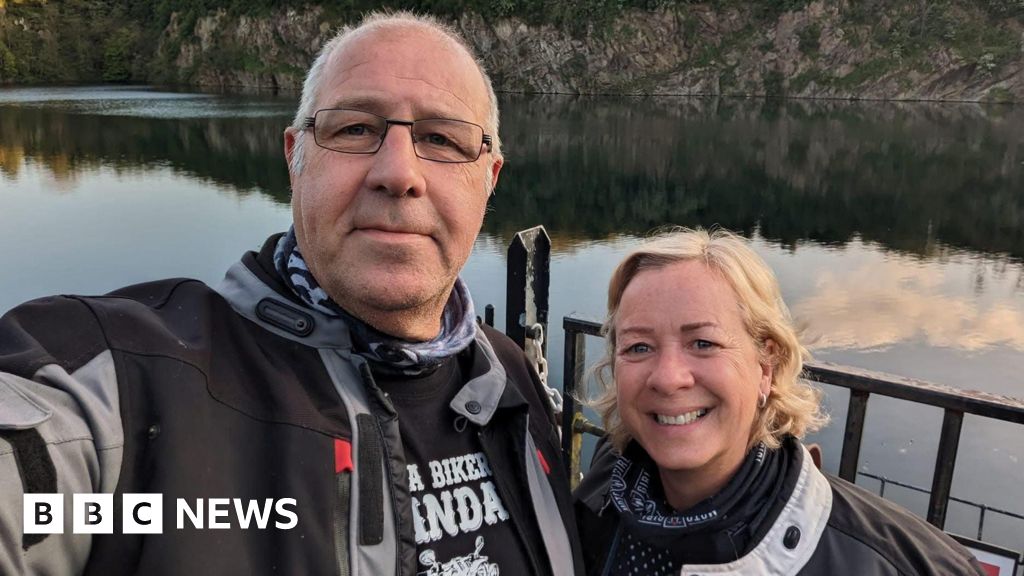An inquest has opened into the death of a British couple killed in a cable car crash near Naples. Elaine and Graeme Winn, who lived in Market Harborough, Leicestershire, died alongside two others after thecable car they were travelling in fell to the ground at Monte Faito on 17 April. Area coroner Ivan Cartwright opened an inquest into their deaths in Leicester on Wednesday. The inquest was put on hold while authorities in Torre Annunziata continue to investigate. Investigators are also believed to be looking into whether strong winds could have been among the causes of the crash. Mr and Mrs Winn were keen motorcyclists and weresaid to have been looking forward to their "dream holiday" in Italyby fellow members of a Market Harborough bikers group, which they helped set up. Mr Winn, 64, had recently retired, while Mrs Winn, 58, worked as a business manager at Welland Park Academy in Market Harborough. A school spokesperson described her as "a much-loved and highly respected member of our school community" after her death. The couple's bodies were repatriated in the days following their deaths and a post-mortem examination was carried out in Leicestershire. But the exact cause of their deaths has been designated as "provisional pending further detail" until the investigation in Italy is completed. Mr Cartwright did not set a timeframe for the inquest to resume as the date of the next hearing will also depend on the findings of the Italian investigation. The two other victims who died in the crash were the driver of the cable car, named by authorities as 59-year-old Carmine Parlato, and an Israeli woman identified as Janan Suliman. Follow BBC Leicester onFacebook, onX, or onInstagram. Send your story ideas toeastmidsnews@bbc.co.ukor viaWhatsAppon 0808 100 2210.
Inquest opens into death of couple in cable car crash
TruthLens AI Suggested Headline:
"Inquest Begins into Fatal Cable Car Accident Involving British Couple in Italy"
TruthLens AI Summary
An inquest has commenced regarding the tragic deaths of a British couple, Elaine and Graeme Winn, who perished in a cable car accident near Naples, Italy, on April 17. The couple, residents of Market Harborough, Leicestershire, were traveling in the cable car when it plummeted to the ground, resulting in their deaths alongside two other individuals. The area coroner, Ivan Cartwright, initiated the inquest in Leicester, but proceedings are currently on hold as investigations continue in Torre Annunziata, Italy. Authorities are examining potential factors contributing to the crash, including the possibility of strong winds. The couple had been eagerly anticipating their holiday in Italy, which was described as a long-awaited dream trip that they had planned for years, reflecting their passion for travel and adventure.
TruthLens AI Analysis
The article covers the inquest into the tragic death of a British couple in a cable car accident in Italy. The report provides background on the couple, the circumstances of their deaths, and the ongoing investigations. It aims to inform the public about the incident while highlighting the couple's community involvement and the impact of their loss.
Public Sentiment and Perception
This news piece likely aims to evoke sympathy and a sense of community loss. By detailing the couple’s background as active community members and their excitement for a "dream holiday," the article fosters a personal connection with readers. This approach may encourage public support for the ongoing investigations into the crash.
Transparency and Omission
While the article presents detailed information about the couple and the incident, it does not delve deeply into the specifics of the crash investigation or the potential causes. This omission could suggest a desire to focus on the emotional aspects rather than the technicalities of the accident, which may limit public understanding of the broader implications.
Comparative Context
In comparison to other news reports on accidents, this article does not appear to connect to broader themes or narratives involving travel safety or infrastructure concerns. Instead, it remains focused on the individual tragedy, which may limit its impact in discussions about systemic issues.
Impact on Society
The news could impact community sentiments regarding travel safety and the reliability of cable car systems. It may raise questions about regulatory standards and safety measures in tourist attractions, potentially influencing public opinion and policy discussions surrounding these issues.
Target Audience
The article likely appeals to the local community in Market Harborough and beyond, particularly those who knew the couple and are interested in travel safety. By highlighting the couple's role in the biking community, it also resonates with motorcycle enthusiasts and travelers.
Economic and Market Implications
While the immediate economic impact on markets is likely minimal, the report could influence the tourism sector by drawing attention to safety concerns in travel. Insurance companies, travel agencies, and infrastructure firms might be affected by heightened scrutiny and public concern about safety standards.
Geopolitical Relevance
The incident itself does not have significant geopolitical implications; however, it does highlight ongoing concerns about safety in tourism, which can resonate in discussions about international travel protocols and regulations.
AI Involvement
It is possible that AI tools were employed in drafting this article, particularly in structuring the information and ensuring clarity. However, the human touch in storytelling, particularly the emphasis on the couple's community connections, suggests a blend of AI assistance and editorial oversight.
Manipulation Potential
The article does not overtly manipulate its readers, but it uses emotional language and personal anecdotes to guide public sentiment. This strategy can enhance engagement but may also lead to a skewed understanding of the incident if readers focus solely on the emotional narrative rather than the factual details.
In summary, the article is credible and effectively conveys the tragic circumstances surrounding the couple's death while fostering community engagement. The focus on personal stories over technical details, however, may limit broader discussions on safety and regulatory issues in cable car travel.
